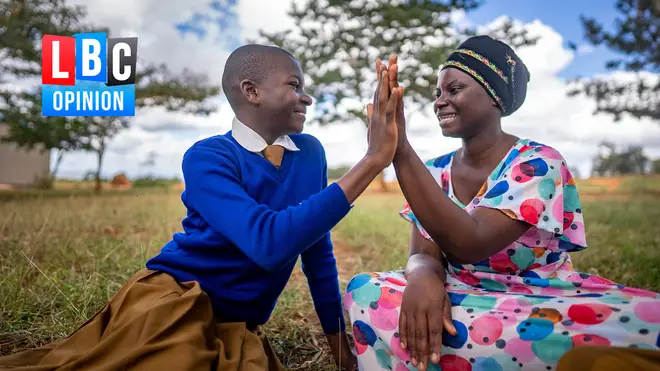Our Terms & Conditions | Our Privacy Policy
Africa’s future lies in educating girls — I know because I was one of them
14 June 2025, 18:13
Amina (right) — a member of the CAMFED Association of women leaders educated with CAMFED support and trained Learner Guide (peer mentor) — with secondary student Hilda.
Picture:
Kumi Media
By Angeline Murimirwa
Change is possible if we invest in young people’s leadership and dismantle the barriers to opportunity for all children.
As I write these words, the drumbeat and dancing from my African village echo through me. My community raised me, and stands with me every day.
At 10 years old, I was destined to join the 95% of girls from the most disadvantaged families in rural Africa who never complete school – just like my mum (who could have been ‘minister of anything’ according to her teacher) and her mother before her.
Instead, I am here today because of a community of support: My teacher, who helped me hide when school fees were being collected; my community, which selected me for financial support from a then-new organisation just as I was about to drop out; and my mother, who sold two buckets of maise to buy me the blanket and toothbrush I needed to board at secondary school. My family missed many meals to see me through.
All paved the way for me to become CEO of CAMFED, the Campaign for Female Education, the very organisation that supported my education.
At CAMFED, we don’t celebrate ‘survival against the odds’; we partner to change the odds for every child on our beautiful continent. We achieve this by investing in grassroots leadership and fostering community ownership of solutions to systemic challenges.
I was among the first 400 CAMFED clients, facing an abyss after graduation. We lacked the job opportunities and skills we needed to thrive. So we formed a sisterhood, called the CAMFED Association, to support each other and those coming behind us. Now we are 313,000 leaders, united by a common goal: to secure every child’s right to learn, thrive and lead.
We co-design and spearhead CAMFED’s programs, and each of us, on average, financially supports three more girls through school – 1.1 million children in 2024 alone – multiplying the investment of generous donors in our communities and across the globe.1 Our commitment is deep and personal: We’ve walked in these children’s shoes, and we’re determined to make their path easier.
Last year nearly 2 million children benefitted from social and learning support from graduates trained as peer mentors (‘Learner Guides’): Young women like Saviour in Ghana, who helped co-create an innovative app connecting peer mentors across Africa; or Naomi in Zambia, named in the BBC 100 Women list for her leadership in sustainable agriculture, supporting communities to grow food in climate-resilient ways while sending more girls to school.
Our sisterhood is powerful because we show up for each other. Need confidence before a big presentation? A sister will help you practice. Have a job interview? A sister will lend you her best dress. We share resources, knowledge and opportunities – creating a network where one woman’s achievement becomes the foundation for another’s breakthrough.
Young women who once felt invisible are now respected “Business Guides”, for example, supporting graduates to grow rural enterprises. We share our expertise as teachers, health workers, engineers and at the policy table – living proof that transformation is possible in this generation when you invest in trusted local leadership to help dismantle the barriers to opportunity for all children.
The results speak for themselves: Girls supported by CAMFED are three times less likely to drop out of school.Since 2020, 124,590 graduates have successfully established businesses and created 235,973 jobs. And their expertise is key to our partnerships with governments, as we work with ministries to scale the peer mentorship model to benefit all children.
People often ask me about our secret sauce. It’s accountability to every single girl; leadership based on lived experience; respectful partnership and co-creation with young people and governments; and it’s about a humble learning culture, deploying research in service to communities to do better, go further and faster.
This Day of the African Child, we remind the world that African women and girls aren’t mere statistics – they’re leaders and changemakers already transforming our continent.
Our sisterhood is growing stronger every day through education – proving that Africa’s greatest resource is the brilliance of children who just need a chance to shine.
________________
Angeline Murimirwa is CEO of CAMFED, a TED speaker, and one of TIME’s 100 most influential people of 2025. She has been honoured with the Africa Education Medal and the Yidan Prize for Education Development.
LBC Opinion provides a platform for diverse opinions on current affairs and matters of public interest.
The views expressed are those of the authors and do not necessarily reflect the official LBC position.
To contact us email opinion@lbc.co.uk
Images are for reference only.Images and contents gathered automatic from google or 3rd party sources.All rights on the images and contents are with their legal original owners.



Comments are closed.